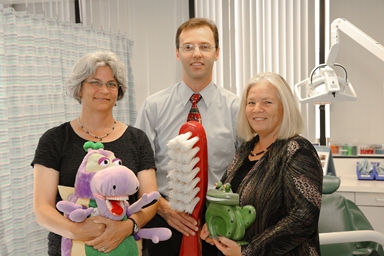CHLA UCEDD Participates in NIH Grant to Explore Sensory-Adapted Dental Environments
May 7, 2012

|
The National Institute of Dental and Craniofacial Research awarded Sharon Cermak, EdD, a two-year grant totaling over a half million dollars. Dr. Cermak has long been active in Maternal & Child Health (MCH) Leadership Education in Neurodevelopmental & Related Disabilities (LEND). She was a LEND trainee at the E.K. Shriver Center of the University of Massachusetts (1975-1976) and Project Director of an Occupational Therapy Training grant from MCH. Prior to her appointment at University of Southern California (USC), Dr. Cermak held a faculty position at Boston University and served as Director of Occupational Therapy Training in the LEND program at the E.K. Shriver Center of the University of Massachusetts. In addition to her primary role as faculty in the USC Division of Occupational Science and Occupational Therapy, Dr. Cermak holds an appointment in the USC Division of Pediatrics and the USC University Center of Excellence in Developmental Disabilities (UCEDD) at Children's Hospital Los Angeles (CHLA). Dr. Cermak is teamed with José Polido, DDS, Head of the Division of Dentistry at Children's Hospital Los Angeles, and Marian Williams, PhD, Clinical Psychologist and Program Area lead/Autism Training Coordinator at the USC UCEDD at CHLA. The grant aims to explore the effectiveness of a "Sensory Adapted Dental Environment" (SADE) on children's behavior.
The study includes 40 ethnically-diverse children ages 6-12, 20 diagnosed with autism spectrum disorder (ASD) and 20 typically developing children. Children with ASD commonly exhibit abnormal sensory processing and sensory sensitivities leading to challenging dental visits, anxiety and negative behavioral reactions to oral care, and consequently a development of poor oral care habits.
The SADE intervention will replace overhead fluorescent lights with soft, colorful lights, and will include soothing music, as well as calming deep-pressure. The sensory adaptations seek to decrease children's anxiety and improve negative behaviors exhibited during dental cleanings to promote a safer, more efficient, less-costly treatment.
"This grant is exciting as the research has potential to revolutionize dental care for children with ASD and children who are experience anxiety at the dentist," Cermak says.
Dr. Cermak collaborates with LEND faculty on several NIH-funded grants an interdisciplinary effort to improve overall health care for children with ASD. If the study demonstrates positive results, the investigators plan to conduct a larger, randomized clinical trial to further test the efficacy of the SADE intervention.







